With judgment no. 4855 of 3 February 2023, the Supreme Court acted on the matter of self-laundering, outlining the scope of application of the cause of non-punishability currently governed by paragraph 5 of Article 648-ter.1., Criminal Code, according to which “other than in the cases referred to in the previous paragraphs, conduct where the money, goods or other benefits are intended for purely personal use or enjoyment are not punishable”. The cited judgment arises from an appeal filed by three defendants, sentenced by the Monza preliminary hearing judge with regard to a number of offences, including illicit drug trafficking and self-laundering.
More specifically, the appellants’ lawyer pleaded that the abovementioned cause of non-punishability had not been applied.
The arguments raised were based on the consideration that the simple depositing, in the current accounts held in the defendants’ names, of the sums of money gained from the drug trading, should have been regarded as an indication of the purely personal use and enjoyment of the money. Therefore the activity in question would not be such as to hinder the identification of the criminal origin of the money.
The Supreme Court did not uphold the appeal and put forward a precise interpretation of the effective applicability of the cause of non-punishability under Article 648-ter.1., paragraph 5, Criminal Code. Firstly, the Court pointed out that, by introducing this cause of non-punishability, the legislature intended to prevent any person from being tried twice for the same unlawful conduct, following a reasoning perfectly consistent with the bis in idem prohibition.
This is because, as we know, the offence of self-laundering punishes the recycling, replacement or transfer of money, goods or other benefit in economic and financial activities, provided that it is carried out by the same person who committed the offence giving rise to the illicit proceeds.
Considering that the typical conduct involved in self-laundering is punishable only to the extent that it is capable of hindering the identification of the unlawful origin of the goods arising from the predicate offence, the Court stated the following: “The abundance of the transactions carried out through numerous current accounts, all serving to launder the sums generated by the illicit drug trafficking, the plurality of the moveable and immovable assets purchased through these transactions, some of which of particular prestige and value [...] all constitute grounds to suspect that the activity carried out was financial and speculative in nature, and that as it lacked the purpose of contingent use of the illicit profit, proves punishable as complex self-laundering, to which the non-punishabilty clause cannot be applied”.
In other words, the Court held that the conditions for applying the cause of non-punishability had not been met, also in view of the significant amount of money paid into the defendants’ accounts.
Furthermore, according to the Court’s interpretation, there was a clear intent on the part of the defendants to conceal the unlawful origin of the proceeds paid in.
Considering that the legislature intended to prosecute “any form of re-injection of proceeds of criminal origin into the legal economy”, the Supreme Court specified that even transactions for the purpose of personal use of the goods, if carried out using significant amounts of money and several current accounts, constitute conduct giving rise to the offence of self-laundering pursuant to Article 648-ter 1, Criminal Code.
Studio Cagnola & Associati
® All rights reserved
